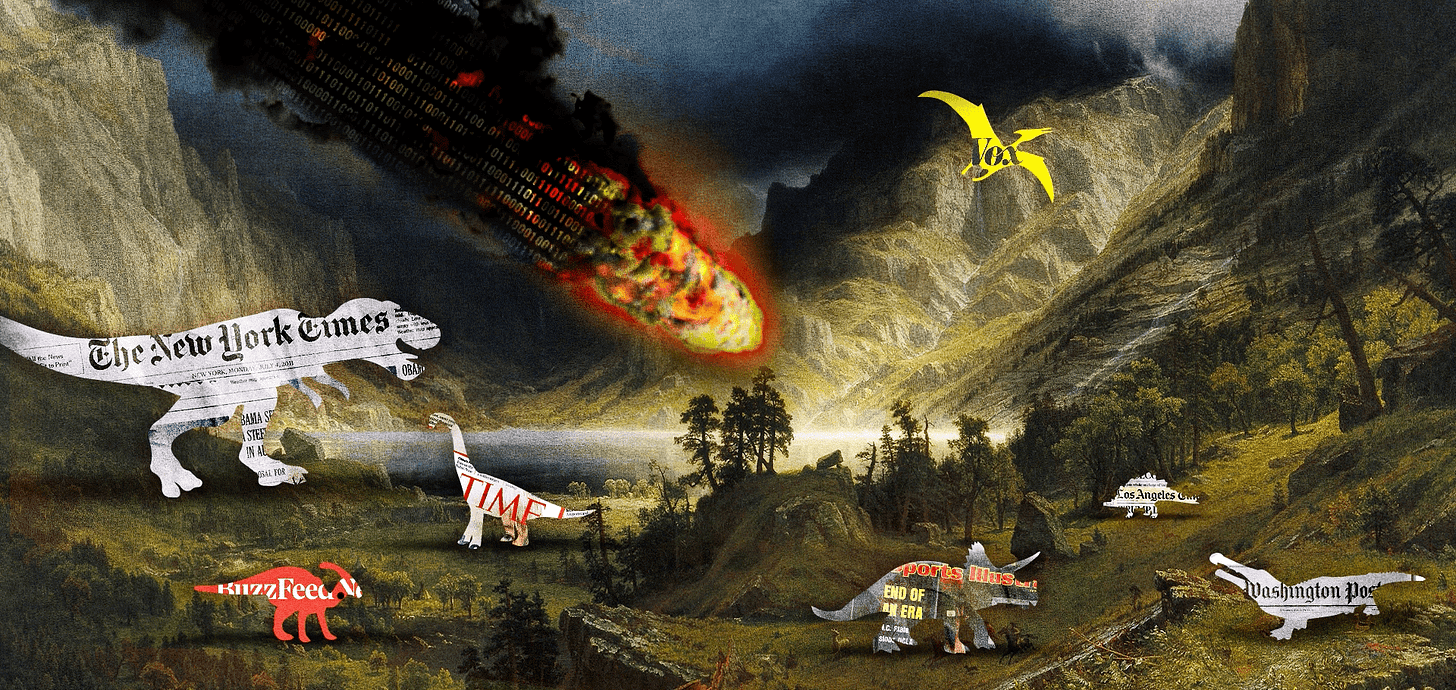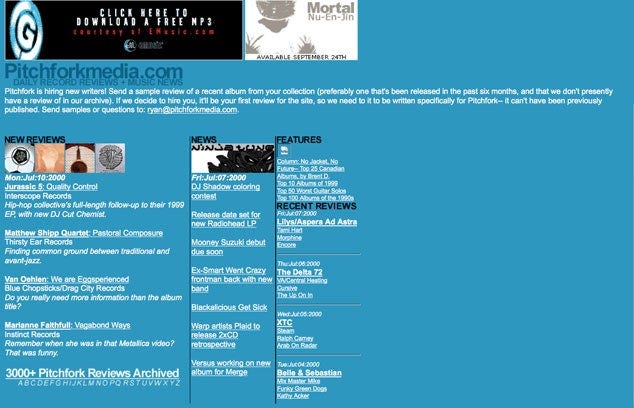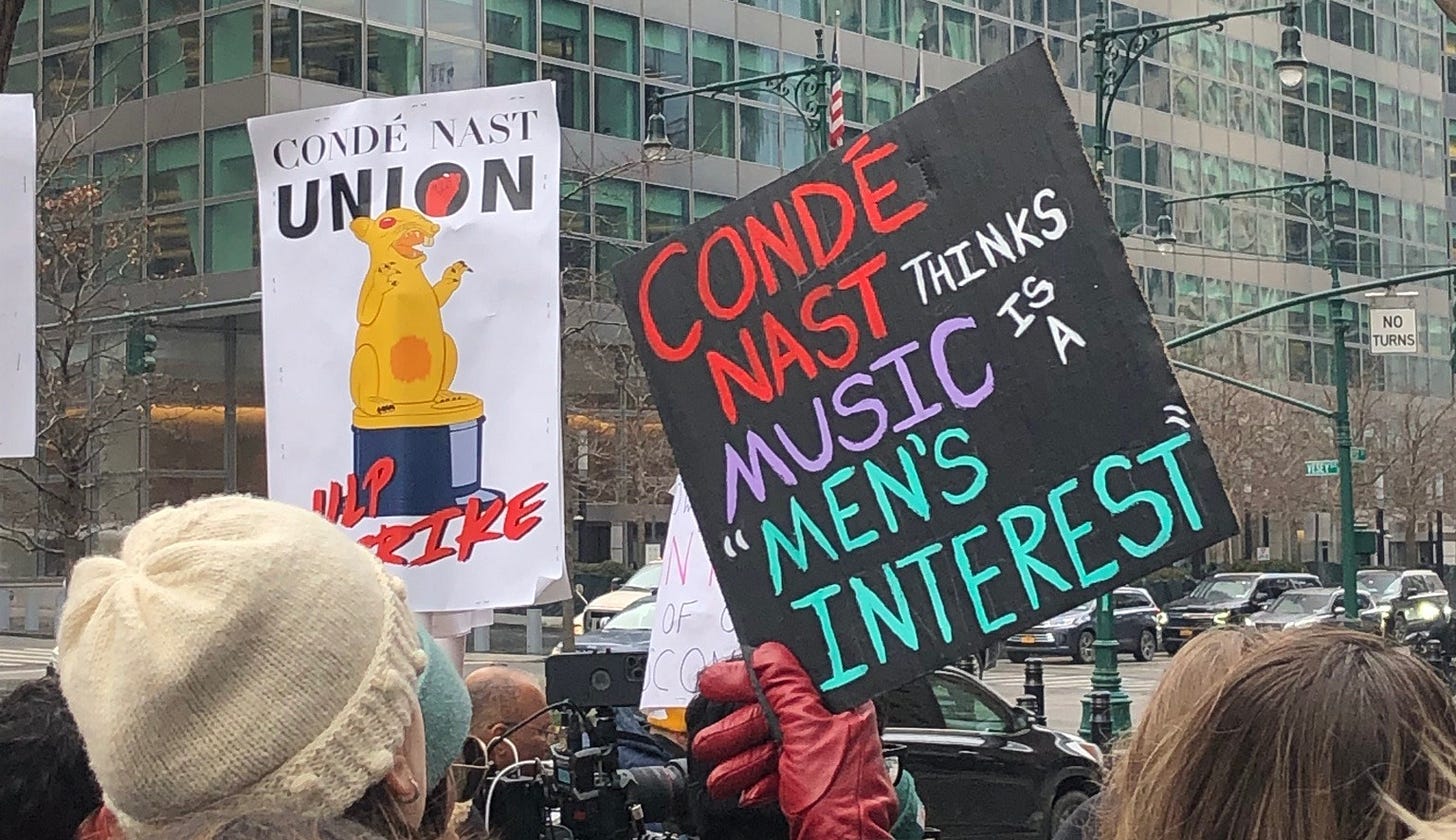At Bolster, understanding the shifting media landscape isn’t just central to what we do, it’s also what we’re passionate about. So when watershed cultural moments happen — as is the case with Pitchfork’s absorption into GQ — we’ll aim to bring you our perspective as an agency that’s in a unique position to observe, report on, and (we hope) shape the cultural conversation. Enjoy!
Over the past year, the world of music journalism has been rocked. Bandcamp has halved its workforce, FACT is phasing out its website, and now, Pitchfork has been absorbed by GQ. Each of these has been a blow, but Pitchfork's feels particularly personal. At first, it was hard to pinpoint why; my engagement with the site was sporadic at best. Yet, I found myself grieving for what this change represents: a distinctive form of music journalism is no more — a form that, through my own habits, I’ve unwittingly let fade.
Pitchfork, for many, stood as the cornerstone of music criticism, offering in-depth analyses, reviews, and features that shaped musical taste and discussion for more than two decades. In mourning Pitchfork's fall, we not only miss the site itself but also what it came to represent — a dedicated space for serious music journalism. Despite its shortcomings – like the famously unserious review of Jet's "Shine On" – it's hard to deny Pitchfork’s impact on the music world. We must now come to terms with how much that world has changed.
Waning Attention
The institutional authority once held by music magazines and their critics has faded, giving way to a landscape where a tweet can hold as much weight as a published review. The era where readers depended on publications for news and reviews has been replaced by a direct line to artists via social media and streaming platforms.
This need for adaptation was something we’ve come to understand deeply at Bolster. We embarked on a research project for Warner Music Australia in 2022 that quantified the shift towards personality-driven media.
While audiences were still drawn to unconventional interviews and in-depth coverage, they were time poor; had dwindling attention spans; and were consuming content through mediums, channels and platforms that better suited their busy lives.
Here are two consumer quotes that really stood out to us.
"I feel like over time, music publications have shifted a lot from where they used to be. I think as social media has made things more immediate, there’s less need for longer discussions." – Sarah, 23, Melbourne
“I’m definitely interested in long-form articles and I love to think about them, but it's demotivating when you're living a lifestyle that's very go, go, go." – Lily, 19, Melbourne
I see a reflection of my own habits in Lily's words. Despite a genuine interest in long-form content, our daily routines relegate deep reading to a ‘later’ that seldom arrives.
And so we leaned on these insights to evolve Warner’s owned publishing platform into something that shifted away from a traditional editorial model. The challenge since then has been balancing personality and depth. While we ventured into this territory, there was a part of me that yearned for the preservation of traditional in-depth music journalism, hoping other outlets would continue to carry the torch.
That hasn’t materialised to say the least.

The Death of the Critic
The move away from traditional editorial is not only about convenience, but reflects a deeper change in the trust dynamics between audiences and the media. Audiences no longer seek out faceless recommendations. Instead, they gravitate towards content that either showcases the personal brand of the presenter (SongPsych/Dev Lemons), highlights the personality of the artist (Vanity Fair’s Lie Detector), or a combination of the two (Chicken Shop Date).
‘Critics,’ it seems, are old news. While it works for The Needle Drop’s Anthony Fantano, audiences are ultimately less receptive to hearing what should be considered ‘objectively’ good music (or any media). Cameron Kozak, a 21-year-old movie reviewer with 1.5 million followers, expressed to the Times:
"When you read a critic’s review, it almost sounds like a computer wrote it. But when you have someone on TikTok who you watch every day and you know their voice and what they like, there’s something personal that people can connect to."
While the desire for negativity has faded, our need for recommendations hasn’t gone anywhere. There remains a need for informed criticism to navigate the overwhelming array of choices available. The issue seems to be more about a generational shift away from mastheads and their critics, rather than a complete rejection of critical insight. The success of music influencers like Derrick Gee highlights that while the form of recommendations has evolved, the demand for musical guidance persists.
Interestingly, when we spoke to Derrick as part of our research project, he lamented genuine criticism’s devolution into something resembling clickbait.
“Criticism has become very hot-takey. It's very First Take on ESPN. It's a bit sad because music reviews have turned into, ‘How viral can I make it as quickly as possible?’”
Winging It
Music journalism has morphed from a gatekeeping role to a storytelling one. A cynic might frame this evolution as a dilution of 'pure' journalism. Others might view this new chapter as a positive step towards authenticity and personal connection. ‘Hot Ones’ becomes our litmus test: Are chicken wings a creative way to forge an intimate connection with the audience, or a cheap gimmick to engage waning attention spans?
Pitchfork, it seemed, felt the latter. It was slow to embrace the move towards personality-led content, from both its artists and its presenters. While it brought on talents like Margeaux Labat (marg.mp3), the platform's editorial guidelines often stripped away the unique voice that could have enriched its stories.
Pitchfork’s cautious approach to video and podcasts reflected a missed opportunity to delve deeper into the craft of music through the distinct voices of its contributors. While this exploration could still happen under the GQ banner, there's a looming concern that content will prioritise musicians’ celebrity over their artistry.
Shawn Reynaldo, a prominent Pitchfork contributor, highlighted this shift in his recent piece for First Floor:
“Music fandom in general appears to be less and less dependent on the actual music an artist makes. Fans increasingly connect with artists specifically because of who they are—or who they think they are… whether that’s communicated via their fashion sense, their politics or their ability to craft an entertaining meme.
Pitchfork folding into ‘Gentlemen’s Quarterly’ means detailed explorations of music will likely become even rarer, replaced by content that emphasises accessibility and immediacy. Not to mention, the move painfully reinforces the notion that music is only for men—a fallacy that the editors at Pitchfork had been working hard to undo.
Where To From Here?
In the midst of these changes, it's important to recognise the cultural foundations laid by platforms like Pitchfork. These mastheads do more than just relay music news; they are pillars of culture, shaping the discourse around music. The potential dissolution of such a cornerstone has wider implications.
James, 24, from Brisbane, captured this sentiment when we spoke to him as part of our research.
“Without music publications talking about music, albums, shows, and everything else, stories get lost. They help to foster the culture and keep the conversation going.”
The changes at Pitchfork remind us of the impermanence of digital and cultural institutions, as the way we discover, appreciate, and interact with music continues to evolve.
So, we stand at a crossroads, grieving the past while confronting the future. Some of us mourn the direct impact Pitchfork had on our musical journeys, while others — like myself — mourn a chapter of music journalism. I mourn my dwindling attention span, the decline of traditional media, and the fading presence of cultural institutions.
Though, as we venture into this new era, all is not lost. There is still great music content to be found. The challenge for publications and independent journalists lies in maintaining the depth and critical engagement of traditional music journalism alongside personality-led content.
Pitchfork's demise isn’t the end, but instead marks a new chapter for music. And while I pine for the written word, I believe that balancing new formats as a vehicle for depth, rather than a replacement for it, has the potential to bring artists and audiences closer than ever before.






